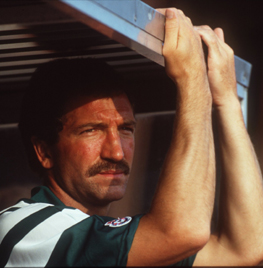- Home /
- History /
- Past Managers /
- Graeme Souness

Date of Birth
6 May 1953
Birthplace
Edinburgh
Nationality
Scottish
Games
157
Games Won
66
Games Drawn
45
Games Lost
46
Staff Honours
FA Cup 1992
Profile
In six highly successful seasons as a Liverpool player Graeme Souness was at the heart of some of the Reds' finest triumphs.
Memorably described as "a bear of a player with the delicacy of a violinist" he was a high-octane blend of amazing strength and bewitching subtlety.
So when the club offered one of its favourite sons the chance to succeed Kenny Dalglish as playing legend turned hot-seat genius, it seemed like a marriage made in red heaven.
After all, it had been an inspired decision to appoint Dalglish, and Souness had already shown the type of managerial acumen required at a club synonymous with silverware during his spell with Glasgow Rangers.
Indeed, he seemed to be the obvious successor following King Kenny's shock resignation and enthusiastically took up the task of building a new Liverpool team.
However, the Souness reign would be hindered by a persistently lengthy injury-list, health problems and a host of questionable signings.
His tenure began in difficult circumstances as he took charge of a flagging side midway through the 1990-91 season.
The Reds had thrown away a lengthy lead at the top of the league and, try as they might, they could not regain their advantage. Arsenal's momentum saw them cruise to the title with Liverpool having to settle for the runners-up spot.
Anyone familiar with the Anfield ethos knows all too well that 'first is first, second is nowhere.'
With this in mind, Souness set about transforming Dalglish's ageing Liverpool team and was keen to stamp his own blueprint on the squad. In came the likes of Mark Wright, Dean Saunders and Mark Walters for big money fees, while Kop favourites such as Peter Beardsley, Steve Staunton and Steve McMahon were allowed to leave.
In an interview some years later he reflected upon his decision to ring overnight changes and admitted he may have been too hasty in allowing some of the side's more senior players to depart.
He said: "What has happened since has gone to prove that I was not to blame for all the ills…my problem, was that I tried to change it too quickly."
That may well have been the case, but although the Reds would end an injury-ravaged 1991-92 campaign in a disappointing sixth place, they would go on to clinch FA Cup success with a 2-0 win over Sunderland at Wembley.
It was a fine achievement for Souey, who overcame life-threatening heart surgery to take his place on the Reds bench alongside a physician, although Ronnie Moran oversaw team affairs on the day.
Hopes were high that, with a fully-fit squad, the Scot would lead Liverpool back to their former glories. Sadly, it would prove to be the height of Souness' success at Anfield.
Another sixth place finish in the league would follow, as would an embarrassing FA Cup defeat against Division Two side Bolton Wanderers.
With confidence in his ability to turn the Reds' fortunes around fading fast Souness continued to fight for the Liverpool cause. But he found that some of the players he had brought in lacked the passion and desire he expected from someone pulling on the red shirt.
He later said: "I found the change of mood in the dressing room both startling and alarming.
"How could standards have slipped so badly? I could not accept the lack of determination and fire in their bodies to win games for Liverpool".
Sadly for the dedicated Scot, he would not be around long enough to put things right as another embarrassing FA Cup defeat, this time against lower division side Bristol City, proved to be his last game in charge.
On announcing his decision to resign he said: "I took this job believing that I could return the club to its former glory but this proved to be more difficult than I anticipated."






















